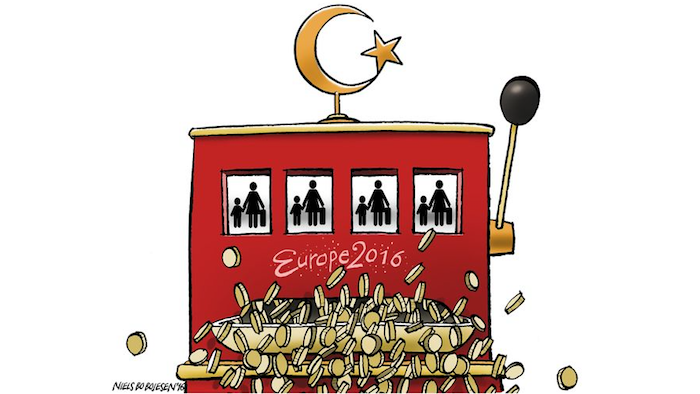The agreement, which will be ratified at a European summit on 17 March, sets out measures to send Syrian asylum seekers back to Turkey if they illegally landed in Greece (while accepting those who made an asylum claim in Turkey), an additional payment of €3 billion to Ankara to manage the refugees, mixed EU-NATO maritime patrols in the Aegean and the re-opening of membership negotiations between Turkey and the EU.
Cengiz Çandar stresses in Hürriyet that the warming of relations between Ankara and the EU “is the work of the government that is the most opposed to the EU” at a moment when —

the EU has more need of Turkey because of the existential threat it sees in the refugee crisis. For the EU, putting an end to the crisis means enlisting the help of Turkey to act as a ‘border guard’. This comes in exchange for hard cash and for the EU to close its eyes to Turkey’s human rights violations and undermining of fundamental liberties.
Receive the best of European journalism straight to your inbox every Thursday
In Türkiye daily Nuri Elibol expresses regret that the EU “has only belatedly woken up” to the atrocities in Syria, and even then “only to stop Syrian refugees from coming rather than to try and halt the humanitarian crisis playing out in their country. Special interests take priority over humanitarian values.” The rapprochement between the EU and Turkey has been organised only to that end, argues the columnist, who adds —

the agreement negotiated between the EU and Turkey seems to be the site of two radically different approaches. The EU wants to leave the table with an agreement or a solution which will sort out the refugee crisis, which it sees as a major headache. On the other hand, Turkey wants to tackle the subject within the broader frame of membership negotiations. Lifting visas in 2016, preparing re-starting membership talks and sending Syrian refugees in Turkey to the EU each month – using the ‘one-in-one-out’ formula – are controversial for some EU member states. But it is though that these problems will be resolved by 17 March. Will the measures solve the Syrian refugee crisis? It is hard to reply in the affirmative to this question.
“As far as Greece is concerned, Ankara has asked to clear the Greek islands of migrants and refugees by moving them back to the continent, before positioning Turkish border officials there to begin the process of sending back a new wave of refugees,” argues Efimerida ton syntakton in Athens. But, it adds —

the latter demand has two consequences: the first concerning whether the EU’s is able to apply and enforce any agreement that may exist and the second regarding the restriction of Greek sovereignty on its own soil. Who could accept such an agreement? Turkey’s ridiculous demands are without doubt informed by the EU’s divisions, with the decision made by the Visegrad countries and Austria to close their borders, and by their racist and nationalist attitudes. And then there is the fact that these countries have take Turkey to task to try and impose their own attitudes. The result is a Gordian knot. What does the future hold? Let us hope that other countries insist on the founding principles of European integration to safe-guard the future of Europe itself.
The result of the EU-Turkey summit of 7 March is that “Europe has won a ten-day delay to make its decision on refugees. In the meantime, bitter negotiations will continue between Brussels and Europe’s capitals. An no one can say what will happen at the 17 March summit,” argues George Malouchos in Greek paper To Vima –

But until then, the borders and the refugees will remain in Greece. So let us wait for another ten days to hear the definitive decision – and the many more that will follow – to see if and how Turkey will put the plan in place, and if and how European countries will respond to Ankara’s delaying tactics. Until then, we will wait with our borders resolutely closed.
For Il Sole 24 Ore’s Adriana Cerretelli, the “iron pact” signed with the power of Recep Tayyip Erdoğan has “suddenly transformed Turkey into the EU’s 29th member state. At least de facto if not de jure.” What is more, it came after “an astonishing U-turn that broke down barriers believed to be unsurmountable and, above all, ignores the minimum required conditions – the respect for Europe’s fundamental values, like freedom of information and expression, sexual equality, protection of minorities.” It is not the first time that European have displayed such “selective amnesia”, Cerretelli adds —

but we have never before seen an EU candidate country, condemned just recently because it was not systematically meeting the essential requirements for membership, creating a new bilateral agreement that doubles the demand for concessions in exchange for halting the flow of migrants. This is the Europe we are used to – cynical and without scruples – but for all its cynicism it has not benefitted from any clear thinking. It has been weakened by the triumph of its own national movements, and remains a prisoner to the usual risk of looking out of place. Even when it plays with its own identity and decides to play fast and loose with its values at the Sultan’s great feast. Time will tell what we will have to show for it.
“Perverse, mad, legally questionable and morally unacceptable”: Die Tageszeitung's Eric Bonse does not mince his words. And his virulent critique is addressed above all at German Chancellor Angela Merkel —

First a forward roll, and now a backflip? The EU’s gymnastics on its refugee policy leave me speechless. [...] Suddenly, not only should the route through the Balkans be blocked to refugees, but the entire Aegean sea should become impassible. And even crazier: for each ‘illegal’ migrant that Greece sends back to Turkey, on ‘legal’ migrant can entre Europe. This so-called ‘one-in-one-out’ principle is said to be the idea of Davutoğlu, the Turkish Prime Minister. In truth, it has the marks of Merkel’s doing – like the entire summit in fact, which was organised at her behest just before Germany’s regional elections. This perverse principle signals a radical break with the right to asylum we are used to in Europe. Before, this right was for individuals, now it will be by-passed through the mass expulsion of refugees. It is legally questionable and morally unacceptable.
For EL País columnist Rubén Amón — “Europe has renounced its values by offering Erdoğan Turkish membership of the EU” —

Unable and unwilling to solve the migrant crisis, the EU has decided to outsource it. It is now an external problem. The EU has enlisted the help of Turkey as its border force, not so much in exchange for €6 billion – double the amount initially envisaged – but for the priceless cost of abandoning its founding values. Either because the EU has exempted itself from any humanitarian responsibility. Or because the agreement authorises immediate expulsions. Or again because the EU has sold off its membership conditions to Turkey well below their value. The big paradox being that Ankara has moved forward in its quest for European integration at the very moment that it is most undermining its democratic standards.
Was this article useful? If so we are delighted!
It is freely available because we believe that the right to free and independent information is essential for democracy. But this right is not guaranteed forever, and independence comes at a cost. We need your support in order to continue publishing independent, multilingual news for all Europeans.
Discover our subscription offers and their exclusive benefits and become a member of our community now!












